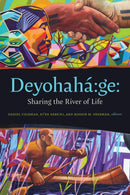Description
Edited by Daniel Coleman, Ki'en Debicki and Bonnie M. Freeman. Ki'en Debicki is a queer, Kanien’keha:ka, enby poet living and loving along the banks of Kanyatarí:io (beautiful lake) in Anonwarore’tsherakayon:ne (Hamilton ON). Bonnie M. Freeman is Algonquin/Mohawk and a member of the Six Nations of the Grand River.
Deyohahá:ge, “two roads or paths” in Cayuga language, evokes the Covenant Chain-Two Row Wampum, known as the “grandfather of the treaties.” Famously, this Haudenosaunee wampum agreement showed how Indigenous people and newcomers could build peace and friendship by respecting each other’s cultures, beliefs, and laws as they shared the river of life.
Written by members of Six Nations and their neighbours, this book’s chapters introduce readers not only to the 17th-century history of how the Dutch and British joined the wampum agreement, but also to how it might restore good relations today. Many Canadians and Americans have never heard of the Covenant Chain or Two Row Wampum, but 200 years of disregard have not obliterated the covenant. We all need to learn about this foundational wampum, because it is resurging in our communities, institutions, and courthouses—charting a way to a future.
The writers of Deyohahá:ge delve into the eco-philosophy, legal evolution, and ethical protocols of two-path peace-making. They tend the sacred, ethical space that many of us navigate between these paths. They show how people today create peace, friendship, and respect—literally—on the river of everyday life.


